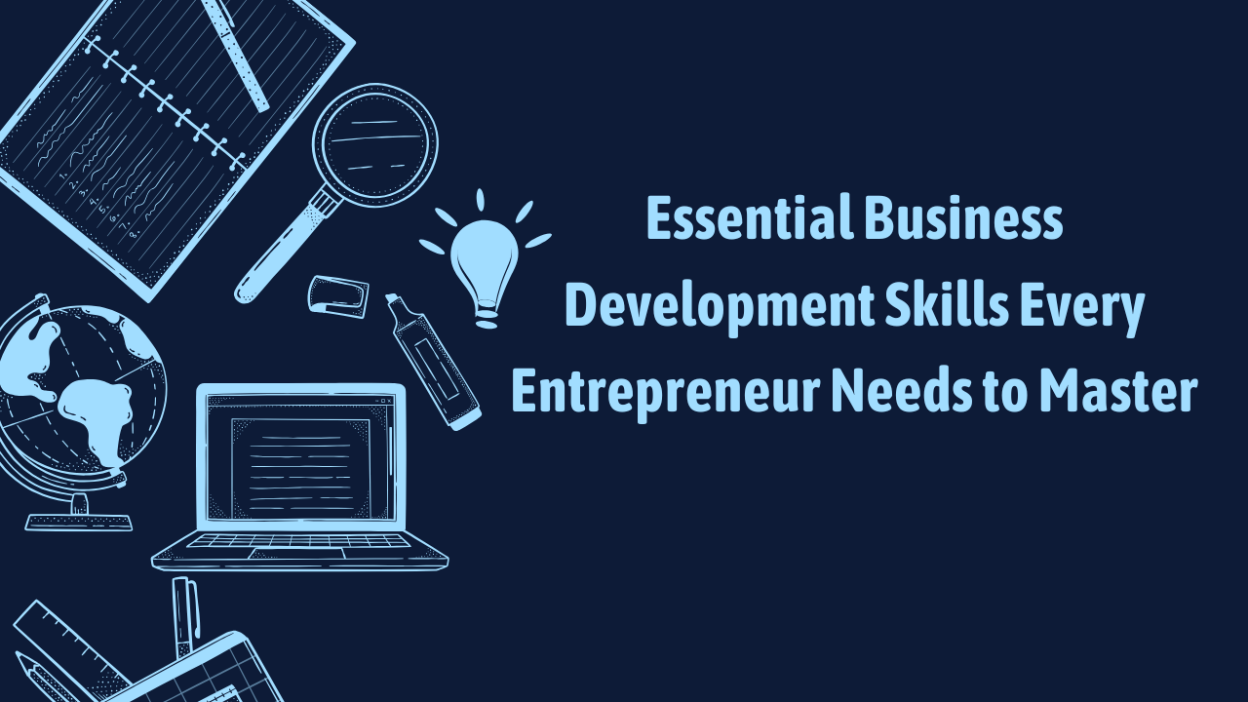As an entrepreneur, I’ve learned that success doesn’t just come from having a great product or a brilliant idea, it’s about knowing how to take that idea and turn it into a thriving business.
Over the years, I’ve realized that mastering business development skills is the key to building a sustainable and growing enterprise. It’s easy to get caught up in the technical side of your business, but without the right business development skills, your company will struggle to scale.
Through trial and error, I’ve discovered that the business development skills you hone as an entrepreneur are what allow you to build meaningful relationships, find new opportunities, and ultimately lead your company to success. In this blog, I’ll share the essential business development skills that every entrepreneur must master to thrive in today’s competitive market.
Table of Contents
Building Strong Relationships with Clients and Partners
One of the first things I learned in my entrepreneurial journey is the importance of relationships. You can have the best product, but if you don’t know how to connect with clients, partners, and stakeholders, your business will struggle. The ability to build and nurture these relationships is a critical business development skill. Here’s why building strong relationships is vital:
- Trust is the foundation: The more you focus on building trust with your clients and partners, the more likely they are to do business with you long-term. I’ve seen how investing in relationship-building early on pays off in dividends over time.
- Networking creates new opportunities: By making meaningful connections and staying active in your industry, you’ll find new opportunities for partnerships, collaborations, and even new clients. Networking isn’t just about collecting business cards, it’s about nurturing relationships that lead to success.
- Referrals and word-of-mouth: Great relationships often lead to referrals. Clients who feel valued are more likely to recommend your services to others, expanding your network organically. I’ve gained a significant portion of my clients through referrals, simply because I took the time to nurture my relationships.
- Effective communication strengthens partnerships: Open and honest communication with partners ensures that both sides are on the same page. When I’ve made the effort to communicate regularly and clearly, my partnerships have been far more successful and long-lasting.
Mastering this business development skill will allow you to create a network that supports and grows with you.
Identifying and Capitalizing on New Opportunities
As an entrepreneur, finding new opportunities is a huge part of what drives business growth. Business development skills like market research, competitor analysis, and trend spotting are essential for staying ahead of the curve.Here’s how identifying opportunities can transform your business:
- Spotting trends before they become mainstream: One of the best ways to stay competitive is by identifying emerging trends early on. I’ve seen businesses get ahead simply by recognizing shifts in the market and pivoting accordingly. Being proactive in spotting trends is a key business development skill that every entrepreneur should master.
- Expanding your offerings: After getting to know my clients’ needs, I’ve learned to develop new services or products that address gaps in the market. By listening to feedback and monitoring what others are offering, I’ve been able to adapt and expand my business in ways I hadn’t initially anticipated.
- Exploring new markets: Knowing how to assess whether your business is ready to expand into a new market is essential. I’ve expanded into new regions and industries after identifying the right time to take that leap. This is one of the most valuable business development skills, knowing when to grow and how to do it.
- Building strategic alliances: I’ve found that opportunities for growth often come through strategic alliances and collaborations. Knowing how to form these partnerships, negotiate terms, and leverage mutual benefits has been crucial in expanding my business.
Being able to spot and capitalize on opportunities is an invaluable business development skill that helps your business stay competitive and relevant in an ever-changing market.
Mastering Negotiation to Drive Profitable Deals
Negotiation is an essential business development skill that often determines whether you close a deal successfully or lose out to a competitor. I’ve learned that negotiation isn’t just about getting the best price, it’s about creating value for both parties. Here’s how strong negotiation skills benefit your business:
- Finding win-win solutions: Successful negotiation is about finding common ground. I’ve had some of the most rewarding business relationships emerge from negotiations where both sides walked away feeling like they got a fair deal. It’s this mindset that leads to long-term success.
- Building confidence: I’ve found that the more you practice negotiating, the more confident you become. Confidence in negotiations shows your clients and partners that you’re serious and credible. This builds trust, which is critical for future deals.
- Understanding value over price: Great negotiators don’t just focus on lowering costs, they focus on the value they can provide. When I’ve been able to show a potential partner the true value of a collaboration, I’ve seen them offer better terms, knowing that the long-term benefits outweigh the short-term costs.
- Managing conflicts and objections: It’s natural for there to be objections during negotiations. A key business development skill I’ve worked on is learning how to address these objections calmly and constructively. Being able to turn objections into opportunities is a powerful tool in closing deals.
Being skilled in negotiation can dramatically improve your bottom line, and it’s one of the key business development skills every entrepreneur should cultivate.
Understanding and Managing Sales Funnels
In my early days, I focused too much on just closing deals without understanding the bigger picture—the sales funnel. Understanding how to build and manage a sales funnel has been a game-changer for my business growth. Here’s why managing the sales funnel is crucial:
- Optimizing lead generation: Knowing where your leads are coming from and how to attract them is one of the most valuable business development skills. I’ve refined my lead generation tactics over time to ensure that I’m attracting the right people who are most likely to convert into customers.
- Nurturing leads until they’re ready to buy: Not every lead is ready to make a purchase right away, and understanding how to nurture them through the funnel is essential. I’ve spent time improving my follow-up process to ensure that leads don’t fall through the cracks.
- Segmentation and targeting: I’ve learned the importance of segmenting my leads based on their interests, behaviors, and purchasing power. By doing so, I’ve been able to craft targeted campaigns that speak directly to their needs, increasing conversion rates.
- Tracking and analytics: Keeping track of how leads move through the funnel is vital for refining your approach. By analyzing which stages are working well and which need improvement, I’ve been able to tweak my sales strategies for better results.
Mastering this business development skill helps you maximize your sales efforts and convert more leads into long-term clients.
Mastering Customer Retention and Loyalty
While attracting new customers is important, retaining the ones you already have is equally, if not more, valuable. I’ve realized that building customer loyalty is an ongoing process that requires attention, care, and the right business development skills. Here’s how customer retention and loyalty have impacted my business:
- Personalizing customer interactions: I’ve learned that providing personalized experiences leads to stronger relationships with customers. By using customer data to tailor recommendations and communications, I’ve been able to keep clients engaged over the long term.
- Rewarding loyalty: Offering loyalty programs or discounts to repeat customers has proven to be an excellent strategy for keeping customers coming back. I’ve found that small gestures of appreciation go a long way in building trust and commitment.
- Soliciting feedback for improvement: To truly understand my customers, I actively seek their feedback. This not only helps me improve my offerings but also makes customers feel heard and valued, enhancing loyalty.
- Building community around the brand: I’ve cultivated a sense of community with my customers by creating spaces for them to engage with each other and the brand, whether through social media or events. This creates emotional connections that keep them coming back.
Mastering business development skills for customer retention has allowed me to build a base of loyal, repeat customers who help sustain and grow my business.
Financial Management and Budgeting for Growth
When it comes to scaling a business, I’ve learned that understanding financial management is one of the most critical business development skills an entrepreneur can have. Without a solid understanding of budgeting, forecasting, and financial planning, your business can quickly run into trouble. Here’s how financial management plays a key role in my business development:
- Managing cash flow effectively: I’ve learned that managing cash flow—ensuring that the business has enough money coming in to cover expenses—is crucial. By forecasting my cash flow and tracking spending, I’ve been able to avoid many financial pitfalls.
- Allocating resources efficiently: Budgeting isn’t just about cutting costs; it’s about allocating resources where they will have the greatest impact. I’ve learned to prioritize spending on initiatives that will help grow the business, such as marketing or hiring key team members.
- Planning for future growth: Financial forecasting has been invaluable in helping me plan for the future. By projecting revenue and expenses, I’ve been able to set realistic growth targets and avoid overextending my resources.
- Securing funding when needed: At certain points, I’ve had to raise capital to fuel my growth. Whether through investors or loans, having a solid financial plan helped me confidently approach potential investors and secure the funding I needed.
By mastering these business development skills, you can ensure that your financial foundation is strong enough to support the growth and scaling of your business.
Maintaining a Positive Company Culture
As an entrepreneur, the culture you create within your company can make or break your business. A positive, motivated team is crucial for long-term success, and that’s why I’ve invested time and effort into creating a strong company culture. Business development skills that focus on leadership, motivation, and culture-building are essential for keeping your team engaged and productive. Here’s how cultivating a positive company culture has benefited my business:
- Attracting top talent: I’ve found that a strong, positive culture helps attract the best talent. People want to work for companies that align with their values and offer a supportive, inclusive environment. Building this culture has helped me recruit and retain top performers.
- Improving employee morale and productivity: A motivated, happy team is a productive one. I’ve made sure that my team feels valued, heard, and part of the mission, which has resulted in higher morale and better overall performance.
- Encouraging collaboration and innovation: A culture of trust and collaboration encourages creativity and idea-sharing. When team members feel comfortable collaborating, it leads to more innovative solutions and problem-solving.
- Maintaining consistency during growth: As the business grows, maintaining a strong company culture becomes even more important. I’ve put systems in place to ensure that the core values of the company are maintained, even as we scale and expand.
With the right business development skills to nurture a positive company culture, your team will be motivated, engaged, and aligned with your business goals.
Building and Scaling Effective Sales Teams
One of the key realizations I’ve had as an entrepreneur is that building a strong, effective sales team can make or break your business. No matter how great your product is, without an exceptional sales team, growth can stall. Developing business development skills related to recruitment, training, and leading a sales team has been essential for scaling my business. Here’s how building an effective sales team impacts growth:
- Hiring the right people: One of the biggest lessons I’ve learned is that not all salespeople are the same. I’ve had to refine my hiring process to ensure that I’m bringing in people who not only understand the product but can connect with customers and drive results.
- Training for success: Sales success isn’t just about hiring top talent—it’s about nurturing and developing their skills. I’ve invested in ongoing training for my team, from refining pitching techniques to handling objections, so they can continuously improve.
- Setting clear goals and expectations: Clear communication and goal-setting are essential for a sales team to perform. I’ve found that when I set realistic yet ambitious sales targets and provide my team with the right tools, they stay motivated and on track.
- Creating a supportive environment: A competitive but supportive sales environment is key. I’ve made sure that my sales team has the resources they need, whether it’s customer insights, marketing materials, or just moral support, to succeed in their roles.
Mastering these business development skills ensures that your sales team is aligned, motivated, and equipped to generate consistent revenue, helping your business grow faster.
Effective Crisis Management and Adaptability
At Qtec Solution Limited, I’ve faced plenty of unexpected challenges. Whether it’s a global crisis, a major client pulling out, or a product launch that didn’t go as planned, I’ve learned that crisis management and adaptability are crucial business development skills that will help keep your business afloat during turbulent times. Here’s how effective crisis management can benefit your business:
- Remaining calm under pressure: The ability to stay calm during a crisis is critical. I’ve found that by staying composed and focused, I can make rational decisions that mitigate the impact of the crisis.
- Adapting strategies quickly: In times of uncertainty, quick adaptation is key. I’ve learned to reassess my strategies on the fly—whether it’s adjusting marketing tactics or changing the product offering—to ensure my business can weather the storm.
- Clear and transparent communication: During a crisis, clear communication with my team and stakeholders is vital. I’ve made it a priority to keep everyone informed about what’s going on, what actions are being taken, and how it impacts them.
- Turning setbacks into opportunities: The best entrepreneurs use challenges as a stepping stone. I’ve often found that some of the greatest opportunities arise from overcoming obstacles. Whether it’s pivoting the business model or launching a new product, crisis situations often push me to innovate.
Mastering business development skills for crisis management and adaptability means you’ll be prepared to handle whatever comes your way, ensuring your business remains resilient and continues to grow.
Creating and Implementing Scalable Systems and Processes
As an entrepreneur, I’ve learned that business development skills focused on creating scalable systems are crucial for long-term growth. When I first started, I was handling everything manually, but as the business grew, I quickly realized that scaling meant building systems that allowed for more efficiency and reduced reliance on manual processes. Here’s how scalable systems have helped my business thrive:
- Automating repetitive tasks: I’ve found that automating tasks like invoicing, customer follow-ups, and inventory management saves time and ensures consistency across the business. Automation has been a key business development skill that allowed me to focus on higher-level strategy and growth.
- Standardizing processes for consistency: I created processes for everything—from onboarding new clients to handling customer complaints—that ensure consistency. These standardized systems allow for easier replication of tasks, making it easier to scale operations.
- Using project management tools effectively: Implementing project management software has helped me and my team stay organized and focused. These tools ensure that everyone is on the same page and projects move forward without missing deadlines.
- Outsourcing non-core functions: I’ve learned to outsource tasks that don’t directly contribute to my core competencies. This allows me to focus on the most important aspects of business development while trusted partners handle administrative or technical tasks.
By building scalable systems and processes, I’ve been able to increase efficiency, reduce costs, and make it easier to scale the business as it grows.
Developing a Long-Term Strategic Vision
In my experience, being able to think long-term has been one of the most important business development skills that any entrepreneur can have. While it’s easy to get caught up in day-to-day operations and short-term wins, I’ve learned that creating and sticking to a long-term vision is what sets successful entrepreneurs apart from those who never break through. Here’s how developing a long-term strategic vision has guided my business:
- Setting clear goals: My long-term vision has helped me define clear, measurable goals for the business. These goals guide my day-to-day decisions and ensure that we’re always moving in the right direction.
- Aligning team efforts with the vision: I’ve made it a point to communicate the long-term vision to my team and align their efforts with it. When everyone understands where the company is headed, it’s easier to stay motivated and focused.
- Anticipating future trends: I’ve learned to think beyond the present moment and anticipate changes in the market. By staying informed about emerging trends and technologies, I can prepare my business to adapt to these changes rather than be caught off guard.
- Building a sustainable growth model: A long-term strategic vision also means building a sustainable growth model. This includes planning for financial stability, expanding to new markets, and developing new products that can ensure long-term success.
Mastering the business development skills required to develop and execute a long-term vision will help you create a business that thrives not just today, but for years to come.
Understanding and Leveraging Your Competitive Advantage
As an entrepreneur, identifying and understanding your competitive advantage is one of the most important business development skills you can have. It’s easy to get distracted by what everyone else is doing, but focusing on what makes your business unique has helped me stay ahead of the competition. Here’s how leveraging my competitive advantage has contributed to my success:
- Identifying what sets you apart: I’ve taken the time to pinpoint what makes my business different. Whether it’s a unique product feature, superior customer service, or a more flexible business model, knowing what sets me apart from competitors has been crucial for attracting customers.
- Communicating your value proposition: Once I identified my competitive advantage, I made sure to communicate it clearly to customers. Being able to succinctly explain why my product or service is better than the competition has helped me win clients and build trust.
- Focusing on what you do best: I’ve found that focusing on my strengths—rather than trying to be all things to all people—has been key. Whether it’s a specific product feature or exceptional customer support, I’ve learned that playing to my strengths helps me stand out.
- Leveraging customer feedback: By continuously gathering feedback from customers, I’ve been able to refine my competitive advantage over time. Customers often provide insights into what they value most, and I’ve used that information to tweak my offerings and stay ahead of competitors.
Mastering business development skills related to your competitive advantage allows you to differentiate yourself from the pack and position your business for success.
Cultivating a Strong Brand and Market Positioning
I’ve always told people that your brand is not just your logo or your product; it’s the perception your market has of you. Business development skills that help you position your brand correctly in the market can make or break your business. Here’s how brand and market positioning can shape your business success:
- Understanding your unique value proposition: I’ve spent a lot of time figuring out what makes my business stand out. A strong value proposition is essential for distinguishing yourself from competitors. When you know what makes you unique, it’s much easier to communicate that to your target market.
- Building a recognizable brand: Consistency in your messaging, logo, and customer experience is key to creating a memorable brand. I’ve found that when my branding is consistent and aligned with my core values, it resonates better with my audience.
- Establishing thought leadership: I’ve worked hard to position myself and my business as a leader in my industry. By creating valuable content and offering insights into the industry, I’ve been able to build trust and credibility, which are crucial for attracting clients and partners.
- Staying relevant in a changing market: The market is constantly shifting, and so is customer preference. I’ve had to stay agile, adapting my brand’s messaging to meet the changing needs of the market and my customers.
When you master business development skills related to brand and market positioning, you’ll be able to carve out a space for your business in a crowded market.
Conclusion
Mastering business development skills is crucial for any entrepreneur who wants to build a sustainable and thriving business. These skills not only help you connect with clients and partners, but they also allow you to spot opportunities, negotiate better deals, manage your sales funnel, and position your brand for success. With practice, you’ll see your business grow and flourish in ways you never thought possible.
Frequently Asked Questions
What are the most important business development skills for entrepreneurs?
Business development skills like relationship-building, negotiation, sales funnel management, and market positioning are crucial for entrepreneurs to master.
How do business development skills help in scaling a business?
These skills allow you to identify new opportunities, build a strong network, and position your brand for long-term success, all of which are essential for scaling.
Can business development skills be learned?
Yes, these skills can be developed through practice, learning from others, and continuously refining your approach.
How can business development skills impact sales?
By understanding how to nurture leads and manage your sales funnel, you can increase your conversion rates and build stronger relationships with customers.
Why is relationship-building such an essential business development skill?
Building strong, trusting relationships with clients, partners, and stakeholders is the foundation of any successful business.




